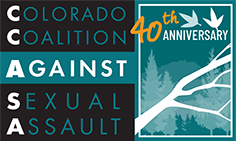— Groups, Boards, Committees
Representing Survivors & Advocates
CCASA staff members participate in a variety of statewide groups, boards and committees. This ensures that sexual assault victims’ and advocates’ needs are considered in the development of statewide policies and practices.
- Colorado SANE/SAFE Project Advisory Committee
- Comprehensive Human Sexuality Education Oversight & Content Committees
- Crime Victim Services Funding Advisory Board
- Domestic Violence Program Funding Advisory Committee
- Ending Violence Against Women Project Advisory Committee
- Forensic Compliance Team
- Higher Education Sexual Misconduct Advisory Committee
- Human Trafficking Council
- Sex Offender Management Board
- Sexual Violence Prevention Program Advisory Committee
